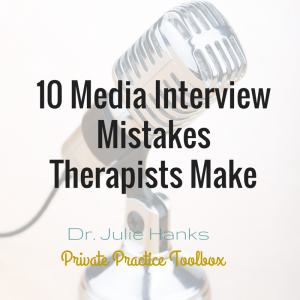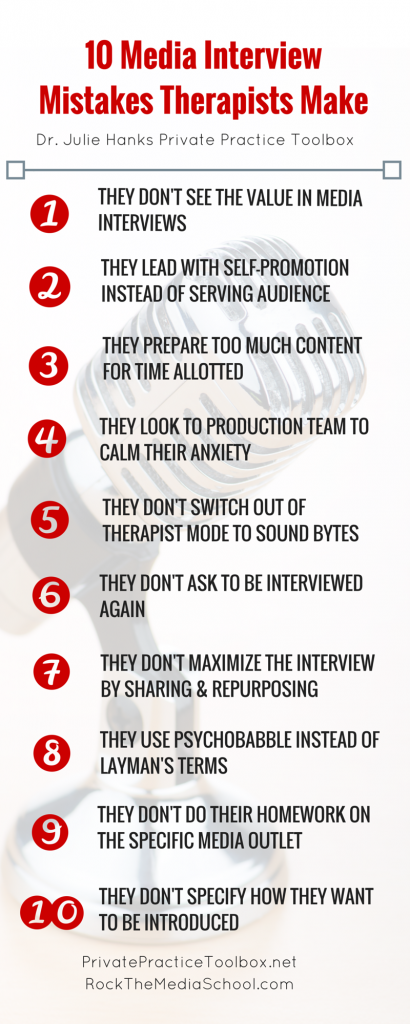 I've written before about how media interviews (television, podcasts, speaking engagements etc.) can be helpful in educating your community about critical mental health issues, establishing yourself as an expert in your field, and perhaps even gaining new clients (click here to learn more benefits of participating in media interviews). But our expertise is as clinical counselors, and many therapists have little to no experience with a cameraman, bright lights, and the general "show-biz" aspect of the process. Over the years, I've noticed a few common mishaps that some individuals (including myself) have made. In hopes of preventing our readers from making these same mistake, here are 10 common interview mistakes therapists make:
I've written before about how media interviews (television, podcasts, speaking engagements etc.) can be helpful in educating your community about critical mental health issues, establishing yourself as an expert in your field, and perhaps even gaining new clients (click here to learn more benefits of participating in media interviews). But our expertise is as clinical counselors, and many therapists have little to no experience with a cameraman, bright lights, and the general "show-biz" aspect of the process. Over the years, I've noticed a few common mishaps that some individuals (including myself) have made. In hopes of preventing our readers from making these same mistake, here are 10 common interview mistakes therapists make:
1. They don't see the value in media presence
Some clinicians may not see the purpose or value of sitting down with someone and having a formal interview about a topic concerning mental health, relationships, or some other aspect relating to their niche. "Wouldn't my time be better spent doing clinical work or working to attract new prospects?" they may wonder. While it's true that you must work to balance your responsibilities, participating in the occasional interview is worth your time. And there is also the possibility that interviews become more frequent and perhaps even becomes a paid opportunity for you. Then it will certainly be valuable as an income stream.
2. They begin by promoting their practice
While media interviews are a great way to get the word out about your therapy practice, avoid being pushy or overly promotional. Don't mention your services first thing. Instead, present your message, then end by giving the name and contact information (usually the website) of your practice. Viewers and listeners will want to hear your thoughts before they are interested in taking the next step. So let your work speak for itself, then close the interview by concisely talking about your practice.
3. They prepare too much material
Time is of the essence in interviews, and you'll have a very specific time allotted to communicate your message. Some therapists may fear running out of things to say, so they prepare an abundance of material. But this technique can backfire, as it may cause you to be too long-winded, neglect valuable pieces of your message, rush to try to fit everything in, or cause you to run out of time. As your prepare your talking points, be mindful of your time limit and even practice your interview in that same time frame.
4. They expect those in production to help them manage nerves
There are many individuals who work together to make sure the interview goes smoothly. The person conducting the interview, the camera operators, sound techs, etc. Everyone has a designated job and are usually very busy in their own responsibilities. If you are feeling nervous about an interview (particularly if it is your first one), know that you probably can't expect these people to be able to help calm your worry. Trust your own self and perhaps bring a friend along if you think you may need moral support.
5. They don't switch out of therapist mode to sound byte mode
The way we speak in an interview is quite different than the way we speak to a client (it's interesting that when we are in the therapist chair, we are the ones asking questions, but in an interview, we are being asked the questions). Good therapists often speak slowly, reflect back, pause often, and go deeper. However, good TV interview skills require the opposite: speak quickly, don’t reflect back, keep the interview moving, and stay on target. Someone may take something you say as a quote to use in an article or to simply remember, so try to make the things you say somewhat "digestible" and even catchy (while not being gimmicky, of course). Read here for specific ways to keep your message clear, concise, and effective.
6. They don't ask to be invited to interview again
If your interview goes well, there's no reason to not do one again in the future! Building that relationship takes time and will not happen in a single media exposure. Self-advocate and ask to be interviewed again by a certain outlet or production crew. The worst they can say is no! Simply asking to be interviewed again has helped me secure and maintain ongoing interview gigs.
7. They don't maximize their interview
An interview is worthless if others do not view/ listen to/ read it. Be sure to maximize it by sharing it via your social media outlets. For example, when I am interviewed for a television segment, I always obtain the link, share it on Facebook and Twitter, then upload the video to my Youtube account and my blog. I want to make sure others know about it. Don't be shy about letting your followers know that you've given your professional insight in a formal setting. Remember, they are interested in what you have to say!
8. They speak in psychobabble
As mentioned previously, in an interview, you're not speaking to a client, but you're not speaking to a psychology professor, either. Make sure you phrase your ideas in ways that others can understand. There's nothing worse than a pretentious expert talking over others' heads. Though you want to establish credibility, your point is not to prove how smart you are, but instead to educate viewers on a specific topic. Don't "dumb down" your message, but avoid using too many theoretical terms.
9. They don't do their homework
It's important to do some research about the media outlet before your interview. Ask yourself: 1) Who is the audience?, 2) What is the tone? 3) What is the format? 4) Who is the host or interviewer? 5) How can I best serve their audience? Once you've gathered this information, use it to inform the content that you prepare and deliver in the interview.
10. They don't specify how they would like to be introduced
Prior to your interview, be very specific about how you would like to be introduced and referred to during the interview. Make sure to include the full name of your private practice. Also, make sure you request that they mention your website, and if it's a TV interview, ask them to display your website address in a visual banner. You are donating your time in exchange for the opportunity to talk about your passion, and in exchange, you get to build trust with your community. So be very clear about who you are, what you do, and how the audience can find out more about your work.
What are some media interview mistakes that YOU'VE experienced?
If you'd like to build your media skills and develop a strong media and social media presence hop on over and check out my new media training just for therapists! Enrollment just opened today and there are a limited number of early bird spots offered at a reduced fee RockTheMediaSchool.com

Join my Private Practice Toolbox Facebook group and connect with over 3100 therapists around the globe in 2 simple steps: 1) Click request to join the group and 2) Fill out this brief questionnaire before you’ll be added to the group.Get practice tips and blog updates in your inbox.
Get 52 FREE Blog Topics and prompts when you sign up for the PPT Newsletter (that’s a year's worth of weekly blog posts!)


As healers, we genuinely like to do our work. Guiding clients through the therapy process and seeing them make progress is why we do what we do. But if you're in private practice, you know there's a lot going on in the back end and that it's crucial to run an efficient and organized business.